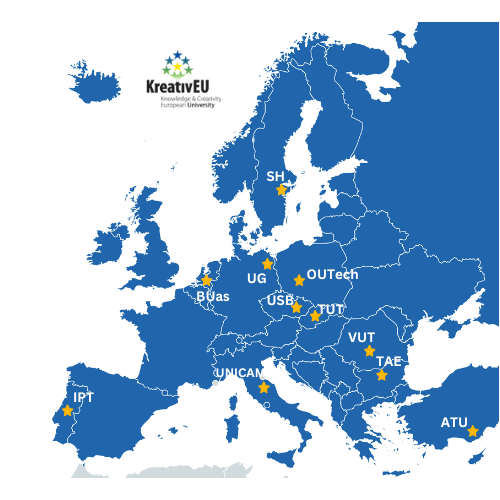KreativEU is a European University Alliance of eleven HEIs from eleven European countries (Portugal, Germany, Netherlands, Italy, Sweden, Czechia, Poland, Slovakia, Romania, Bulgaria, Turkiye). 
The KreativEU alliance is unique in its kind, offering a competitive and an attractive European education and research system, with students, researchers, academics, and society, at large, cooperating within different cultures and across borders and academic disciplines.
A collective effort began in 2021 with the first brainstorming meetings between founder Universities.
The journey toward alliance formalisation witnessed pivotal moments during a series of meetings, with Tomar, Portugal, acting as a focal point in both September 2022 and October 2023 meetings. These gatherings set the groundwork for the alliance’s evolution and strengthened its resolve to advance shared goals. As the alliance evolved, subsequent meetings in Montpellier, Adana, České Budějovice, Svishtov, Trnava, Targoviste, and Camerino solidified its framework, with seven founding members, which led by the Polytechnic University of Tomar, secured 81 points and a Seal of Excellence in the 2023 Erasmus+ European Universities call. After the October 2023 meeting in Tomar, the alliance expanded to eleven HEIs.
The KreativEU alliance was established based on:
- The willingness of the eleven members to develop a unique alliance of HEIs across Europe, linking and connecting differing tangible and intangible cultural identities to a common European value.
- The complementarity and interdisciplinarity offered among the consortium, especially in research and education.
- The small size but high-ranking profile of the eleven HEIs. With a total number of 74558 students almost all institutions have under 10000 students, but they are ranked high among small HEIs, especially in relation to their pioneering and interdisciplinary approach to cultural heritage preservation, enhancement and valorisation.
- Prior cooperation especially within Erasmus projects and mobility agreements, with several researchers already collaborating across the several institutions.
- The wide geographical coverage. Partners were chosen based on their differing cultural traditions and identities and on their potential of representativeness in the European level. This is of the utmost importance to foster outstanding deliverables and a high impact.
- All partner institutions are based on historical cities.
The KreativEU alliance is targeted at:
- Promoting novel, high-quality and highly relevant learning opportunities for students at bachelor, master, and doctoral levels and in the realm of life-long learning and continuing professional development, by fostering student-led learning, research-oriented learning, and experiential learning outside the classroom and by promoting the open and the digital education paradigms. Recognising the inseparable interconnection of tangible and intangible cultural heritage, as well as the interwoven nature of local and national traditions, crafts, cultural practices, folklore, and ecocultural identity, the courses and study programmes offered by KreativEU will reevaluate these elements and their associated ecological surroundings, the lived environment, especially in the context of the digital age, across different academic disciplines and fields of expertise.
- Promoting a high quality and transnational research environment, by investing upon local, regional, and national ecocultural identities, heritage, traditions, architecture, crafts, folklore, and cultural landscape, linking, and connecting it to a broader European perspective, as to contribute to the establishment of a European University unique in its kind, capable of offering a competitive and an attractive European Research system.
- Establishing a European knowledge-creation and design network that mobilises the four missions of Higher Education (Education, Research, Innovation and Service to Society) to develop, through a challenge-based approach, Ethical-by-Design and Sustainable-by-Design AI systems based on European values. The challenge-based approaches through which these AI systems will be developed purposely account for European values, identity, and diversity, resting on the premise that European history and both tangible and intangible European heritage are key components of a future that is enriching, sustainable, and inclusive. Consequently, the resulting innovative yet feasible and effective AI systems will have the potential to contribute significantly to addressing global challenges, such as climate change, digital transition, biodiversity loss, inequality, and social exclusion in a way that aligns with European values and policies.
- Establishing a fully European University, aimed at creating a long-term institutional structural and strategic cooperation, for the implementation of a competitive and attractive educational model for the enhancement of the European cohesion by fostering its artistic and cultural diversity, linking education, research, and innovation at the service of society, through the KreativEU inter-university Heritage European campus where students, staff and researchers can enjoy seamless mobility and create new knowledge together, across countries and disciplines.
- Offering sustainable transnational mobility opportunities, (both physical, with as environmentally friendly means of travel as possible, and virtual), in addition to regular Erasmus+ mobility schemes, to all parties involved in the Alliance: students, researchers, teachers, professors, administrative and support staff, stakeholders, and alumni.

